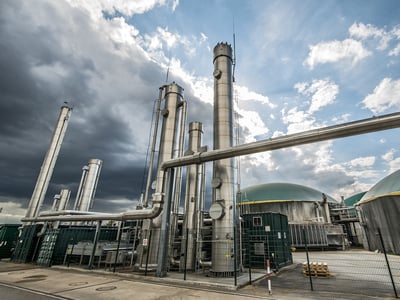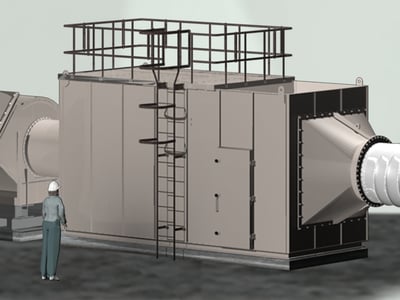Camfil’s robust molecular filters help to eliminate odor nuisances and remove heavily contaminated gases from this highly valuable resource for renewable energy, compost and soil enhancers.
When biodegradable organic waste is collected or segregated from a mixed waste stream, it provides value as a fuel for energy production or as raw material for compost or fertilizer. Important categories of organic waste include manure, food waste, grass cuttings and crop residues.
Anaerobic (without oxygen) digestion processes are used to make biogas, while compost is made using an aerobic (with oxygen) digestion process. Any biodegradation process produces a complex mixture of gases which can create an odor nuisance or, in the case of biogas, a corrosion hazard for the combustion engine. Molecular filtration helps to eliminate these problems.
Biogas is gaining importance worldwide as recycled organic waste replaces non-sustainable fossil fuel sources of energy production. When organic waste is digested in an anaerobic process, the resulting methane – the fuel for energy production – can be heavily contaminated with unwanted substances that can cause corrosion or abrasion.
If high concentrations of H2S are allowed to reach the gas engine where the methane is combusted to generate energy, the engine can suffer internal corrosion due to a combination of the acidic gas and high temperatures. Engine corrosion requires unscheduled downtime for maintenance and repair – increasing maintenance costs and lowering output and profit for the biogas plant. Many anaerobic digesters and biogas engines are located close to the feedstock of organic waste, i.e. on farms. In-line molecular filtration is the accepted method of removing hydrogen sulfide from biogas prior to combustion.
Organic waste can be partially biodegraded in an aerobic process to make compost or soil-enhancing products. Little or no hydrogen sulfide is produced but a lot of the volatile organic content of the waste is released. This can create an odor nuisance due to the very high intensity. The gas mixture responsible for the odor is very complex, but a major constituent will be terpenes such as alpha-pinene.
You can use molecular filtration as an odor control method both on the exhaust from the production building and in the ventilation system of machinery used inside the process hall to turn and mix the rotting waste.
With Camfil’s dedicated molecular filtration solutions, you can keep troublesome odors away from neighboring areas and filter out contaminated gases before they reach the combustion engine.

Protect the membranes that clean your biogas before injection. Control engine corrosion and abrasion with adsorbents in leak-free housings. Efficiently and safely remove hydrogen sulfide (H2S) and siloxanes to help eliminate unscheduled repairs and downtime.

Protect the environment and people from dangerous or high concentrations of particles and molecules released by industrial processes, comply with local safety regulations and reduce operating costs of your exhaust air filtration system.

Energy Cost Index (ECI) 5-Star Rating System set the standards for air filter performance. The more stars means better air filter performance and higher energy savings. Get recognized for saving energy, shrinking waste, reducing carbon footprint and improving indoor air quality.
Air quality Virus Contamination Control Electronics and optics Education and experience Commercial and public buildings Manufacturing and machinery Sustainability Take a Breath Case studies Food and beverage Life science and healthcare